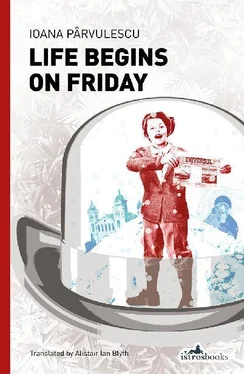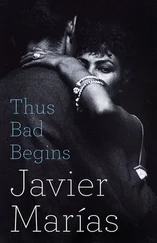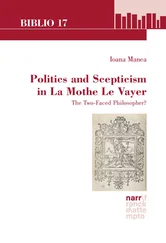Nicu took the envelope and placed it inside his coat, taking care not to crumple it. Then he bowed to Jacques’s sister, in the way he had seen important men bow (such as Mr Cazzavillan to the editors’ wives) but the girl burst out laughing and grasping his chin, lifted it towards her. In that way he was able to see that she did not look at all well that morning: one cheek had risen like sweet bread dough, the other was hollow. But both cheeks were rosy. To Nicu, Miss Iulia was like the lighthouses that Universul had written about not long ago: one, in Tuzla, had a red beacon, and the other, in Mangalia, a white one. With her too, now one beacon lit up, now the other, because the white one also shone. Now the Tuzla lighthouse was shining.
‘I am waiting for his reply — you will tell him, won’t you? And above all, deliver it to him personally. If that is not possible, deliver it to Mr Mihai Livizeanu, a man with a lock of hair that falls over his forehead. He is his brother, a student in Paris. If not, then bring it back to me, but no, don’t do that, please wait until he comes, do you promise me?’
Now the red Tuzla beacon had gone out and the Mangalia one was shining. That was women for you! He set off towards the tram stop, preoccupied. Iulia Margulis was not a person he could refuse. You could refuse the doctor, because he was a calm man and an understanding one, the doctor’s wife you could refuse because she was a mother, Jacques you could refuse because it was between men, but your heart would not allow you to refuse his sister for any reason. Not even he could understand why. But he had absolutely no inclination, he was ‘outside working hours,’ proof of which was that he was not wearing his peaked cap, but rather a normal hat. He had come to play soldiers with Jacques, but still he could not get away from work.
‘You’re busy and ultra-busy, young man,’ he said confidingly to a dog on the street, ‘you don’t get a moment’s peace or quiet. A thousand chores…’
The dog wagged its tail and followed him for a while, before abandoning him, as if having reached some invisible boundary. The City Hall had given the order that all house-holders and tenants clear the snow from in front of their buildings and scatter ashes, so that people would not slip and break their legs. But even so, his boots were still slippery and he ran and slid wherever he could. Reaching the tram stop, he waited. Then a girl came up, holding her mother’s hand, and he felt an electric spark (although he had never felt an electric spark), which tingled from his cap to the toes of his boots. He moved closer to the two and the scent of lemon balm enveloped him like springtime. It was as if the white of the snow was all of a sudden green and on the verdure he saw white flowers of lemon balm with yellow centres.
‘Mama, why is that thin little boy alone? And why is he dressed like that?’ he heard the girl say, and her mother jerked her hand and made a sign for her to be quiet.
Whereas before he had felt suffused with love, now the tingles, still streaming from his head to the toes of his boots, were of double offence. Who does that little ninny think she is? Little was one way of putting it; in fact she was tall. Therefore he postponed yet again his much-wished-for encounter with his great love, with his beautiful fiancée. His attention was then drawn to a hole and since lately his imagination had been inflamed by the tunnels of moles and their life beneath the earth, he wounded whether it might lead to the dark houses and streets of the moles. He might have asked the lanky girl, but any conversation with her was out of the question now. He made a point of not boarding the tram so that he would not be forced, God forbid, to sit next to her and start smelling of lemon balm. He would take the next one. But it was obvious that it was one of those unlucky Tuesdays that the old biddies talk about. For, after he had been sent out into the cold, instead of being left to play by the fire, and after he had been insulted by a stupid little girl, albeit a rather tall one, instead of sinking into the arms of love, he saw the one man in the world whom he could not abide come to stand next to him at the tram stop, a man for whom he felt fear, and above all repulsion. He was a thief who skinned him like a rabbit whenever he bumped into him. Any attempt at self-defence was futile, and so were cries for help, and so Nicu, after weighing up the situation, either fled, if he was in a crowded place, or suffered himself to be robbed and humiliated. Sandu, known as the Muzzle, one of the police’s regular customers, was always to be found wherever there was disorder in the Capital: in the recent events, the riots on Strada Carol, he had looted a number of shops. As he twisted his arm behind his back, Nicu could smell the stench of his muzzle — his moniker came from the shape of his mouth.
‘Hey, it’s the lad with the crazy ma, come here and hand over the loot.’
The boy, who usually endured aggression like a bitter taste that would soon pass, remembered in horror that today he was carrying two things that the drunkard must not find at any cost: the cow he had received from Dan (Fira as she had been dubbed) and Miss Margulis’ letter. He therefore strategically produced the tram fare that Iulia had given him and made a show of reluctantly surrendering it, with lowered eyes. The thief straight away tucked it in an inside pocket, and then he started mocking the lad, now insulting him verbally, now twisting his arm behind his back, loosening his grip and then twisting again even harder. Nicu knew from the fable of the fox that he had to cry out when it did not hurt at all and to keep dead silent when it did, and so he kept dead silent.
‘Want some more, eh, you little tyke, what’s this, trying to stand up to Sandu? Standing up to Sandu, are you? To the Muzzle, eh, you little whelp?’ He thrust his muzzle close to the boy’s face.
Nicu reckoned it was the moment to shout at the top of his lungs that he was hurting him, especially since he was crying real tears. But because the tram had just left, there was nobody at the stop to protect him. The thief started searching him, carelessly, pausing frequently, breathing plum brandy fumes into Nicu’s face. Nicu thought that he might get away with it, but no, the thief had found Fira. He looked at her without interest and tossed her into the ‘mole’s hole,’ and then straight away he found the envelope in the left-hand pocket of Nicu’s coat. He did not know how to read, and so he tore it in two and tossed it after Nicu’s cow, into the hole, like a shroud. After convincing himself that there was nothing else worthy of his attention in the lad’s pockets, he pummelled him a couple of times, and then told him to sling his hook. Nicu walked away, dragging his feet, and hid behind the first corner. The thief had not left; he sat down on the bench and took out his bottle. People began to arrive, who cast him suspicious glances, and then the tram stop began to fill up, and so the drunkard left, all of a sudden very humble, with his tail between his legs. Like all bullies, he was very courageous in front of the weak. His victims of choice were children and young maidservants. A flock of crows filled the sky with blackness and croaking, as if rasping against the firmament.
Nicu went to the hole and assessed the extent of the damage. He felt almost the same as he had at his grandmother’s funeral, when, aged seven, no matter how much it had pained him, he had bawled and wept. That grim Tuesday was the first time he had ever lost something that had been entrusted to him and he was very ashamed. He pictured himself losing his job and his livelihood. The first rule for errand boys was not to lose or damage anything. Not even a petal, his boss used to say, although with some bunches of roses that was almost impossible. He thought of his mother, who had difficulty finding work in winter, and when she had her fits, nobody wanted her. He was terrified she might end up at Mărcuța’s and he at the orphanage, as a woman from his neighbourhood kept threatening he would. He took the envelope out of the mole’s hole; it was torn and wet. He could not take it like that to Mr Alexandru Livezeanu, and not could he take it back to Iulia Margulis, who was waiting for an answer. In fact there was nobody in the world he could tell about what had befallen him. He burst into a flood of tears.
Читать дальше












